What to Know About the 15 Most Popular Weight Loss Diets of 2024

Key Takeaways
New weight loss diets pop up often, followed by claims about their effectiveness. And although your nutrition is an important aspect of weight management, it can be hard to know if these popular diets are really effective for long-term weight loss.
So how can you know if you’re following a healthy diet? And are there any risks involved with certain weight loss diets?
In this article, we’ll take a look at some of the most popular weight loss diets of 2024 and what you should know about them. Read on to learn more.
What is the Most Effective Diet to Lose Weight?
Because every person has individual needs, there is not necessarily one best diet for weight loss. Someone may benefit from following a certain diet plan, but that diet may not work well for someone else.
In general, an effective weight loss diet will likely include themes such as:
- Plant foods, like fruits and vegetables, which contain fiber and other necessary nutrients that can benefit weight loss
- Adequate protein intake, which is important for weight loss
- Few highly processed foods or ultra-processed foods, which are associated with weight gain and other serious health conditions
- A reduced sugar and/or refined carb intake
- Adequate (but not excessive) essential fatty acid intake, including diversifying fat intake - perhaps reducing high saturated fat intake and including monounsaturated-rich foods and foods rich in omega 3 fatty acids.
So, with this in mind, here’s what you need to know about 15 of today’s most popular weight loss diets. Nutrisense dietitian Heather Davis, MS, RDN, LDN will also share expert insight into how each one may be effective.
1) Paleo Diet

The Paleo diet is a modern interpretation of what humans likely ate during the Paleolithic era, about 2.5 million years ago. People who practice the Paleo diet try to avoid processed foods and limit their consumption of dairy, gluten-containing grains, and legumes. Instead, they eat:
- Fruits
- Vegetables
- Nuts
- Fish and seafood
- Eggs
- Lean, unprocessed meats
What Heather Thinks:
While short-term studies suggest that some versions of the Paleo diet may reduce the risk of type 2 diabetes, heart disease, and obesity, research is limited to studies with small sample sizes.
There are some elements of the so-called Paleo diet that might be beneficial for some people, such as the reduction of gluten if someone is sensitive to gluten. However, many researchers still believe that the strict elimination of dairy, legumes, and whole grains may lack strong evidence to support the broad recommendation of this diet.
In fact, over-restriction of nutrient-dense whole foods may contribute to nutrient imbalances and deficiencies over time.
2) Whole Food Plant-Based Diet
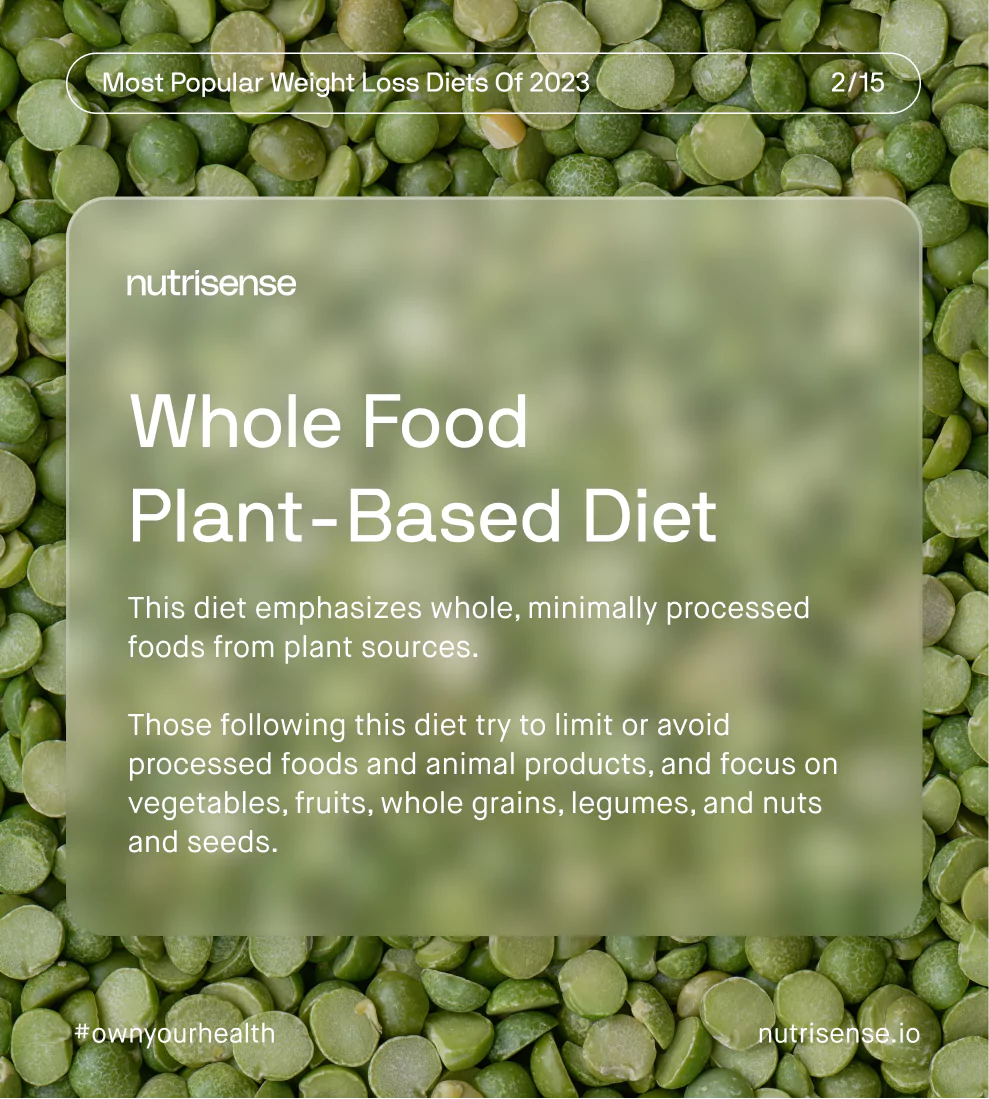
As the name suggests, a whole food, plant-based diet (WFPB) emphasizes whole, minimally processed foods from plant sources. Those following this diet try to limit or avoid processed foods and animal products, and focus on vegetables, fruits, whole grains, legumes, and nuts and seeds.
What Heather Thinks:
Above all, we must remember that everyone is unique. When considering a WFPB diet, it’s important to be aware of the nutrients it may contain or that it may be lacking compared to an omnivore approach.
Vegan diets, for example, tend to have increased risks for deficiency in zinc, calcium, vitamin D, iron, omega 3 fatty acids, and B12. However, research suggests that the WFPB diet can be effective at lowering weight, BMI, and cholesterol.
Plant-based diets may also reduce the risk of type 2 diabetes. However, studies are still very limited in this area and more research is needed.
3) DASH diet
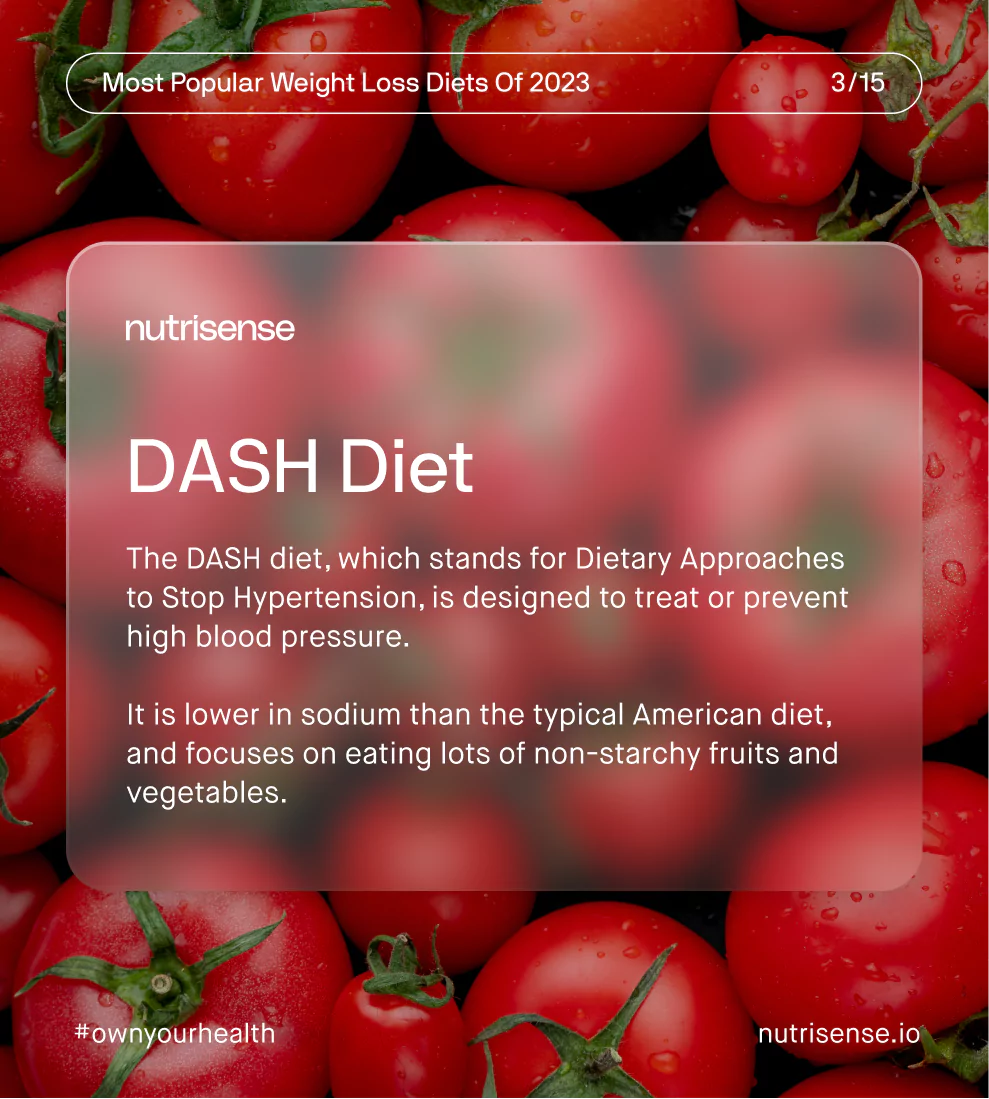
The DASH diet, which stands for Dietary Approaches to Stop Hypertension, is designed to treat or prevent high blood pressure. It is lower in sodium than the typical American diet, and focuses on eating lots of non-starchy fruits and vegetables.
It also includes moderate amounts of low-fat dairy products, whole grains, lean meats, legumes, eggs, fish, and nuts and seeds. The DASH diet limits sweets and sugary drinks, saturated fats, alcohol, sodium, and processed foods.
What Heather Thinks:
Research shows that the DASH diet may be effective at lowering and managing high blood pressure in some cases. There are many elements about the DASH diet that may be helpful, including high intake of nutrient-dense whole foods and limiting added sugar, processed foods, and alcohol.
However, some have criticized what they consider to be the diet’s more extreme approach to salt or sodium restriction. Genetic factors around “salt sensitivity” may inform the effect of sodium on blood pressure, such that some individuals are less affected by sodium and others more so.
4) Mediterranean Diet
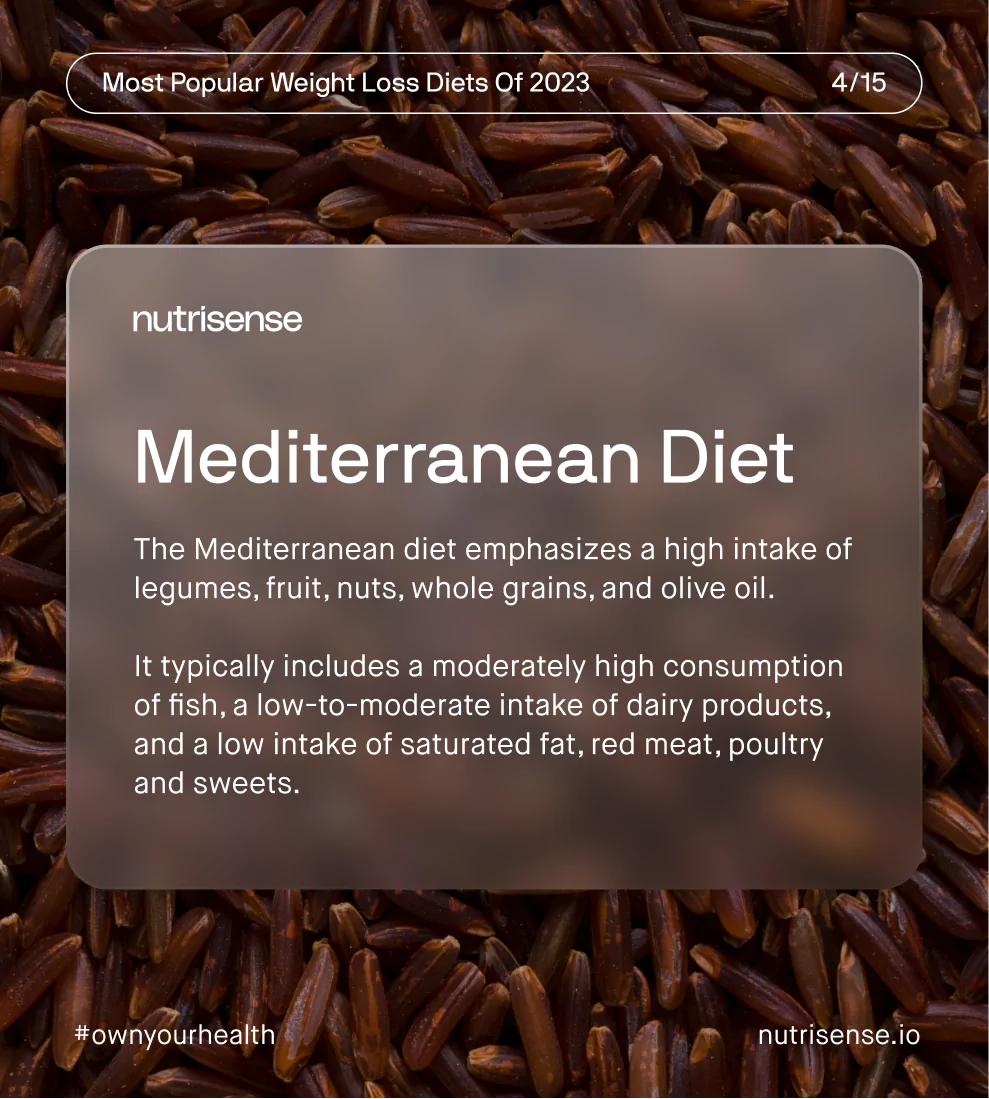
The Mediterranean diet is based on the dietary patterns of several countries in the Mediterranean, most notably Greece and Southern Italy. It emphasizes a high intake of legumes, fruit, nuts, whole grains, and olive oil.
It typically includes a moderately high consumption of fish, a low-to-moderate intake of dairy products, and a low intake of saturated fat, red meat, poultry and sweets.
What Heather Thinks:
The Mediterranean diet is one of the most heavily researched diets, and has been shown to lower your chances of stroke and heart attack, reduce the risk of depression, and improve cognitive function. It’s also been shown to promote weight loss and blood sugar control for some groups of people.
There are many reasons this diet may be beneficial for some, including the way it promotes a high intake of low-processed, nutrient-dense whole foods. As with every dietary recommendation, the goal is to customize for best results.
I see this diet as a good generic framework for many people, with the need for additional adjustment for individual tolerance and needs.
5) Keto Diet
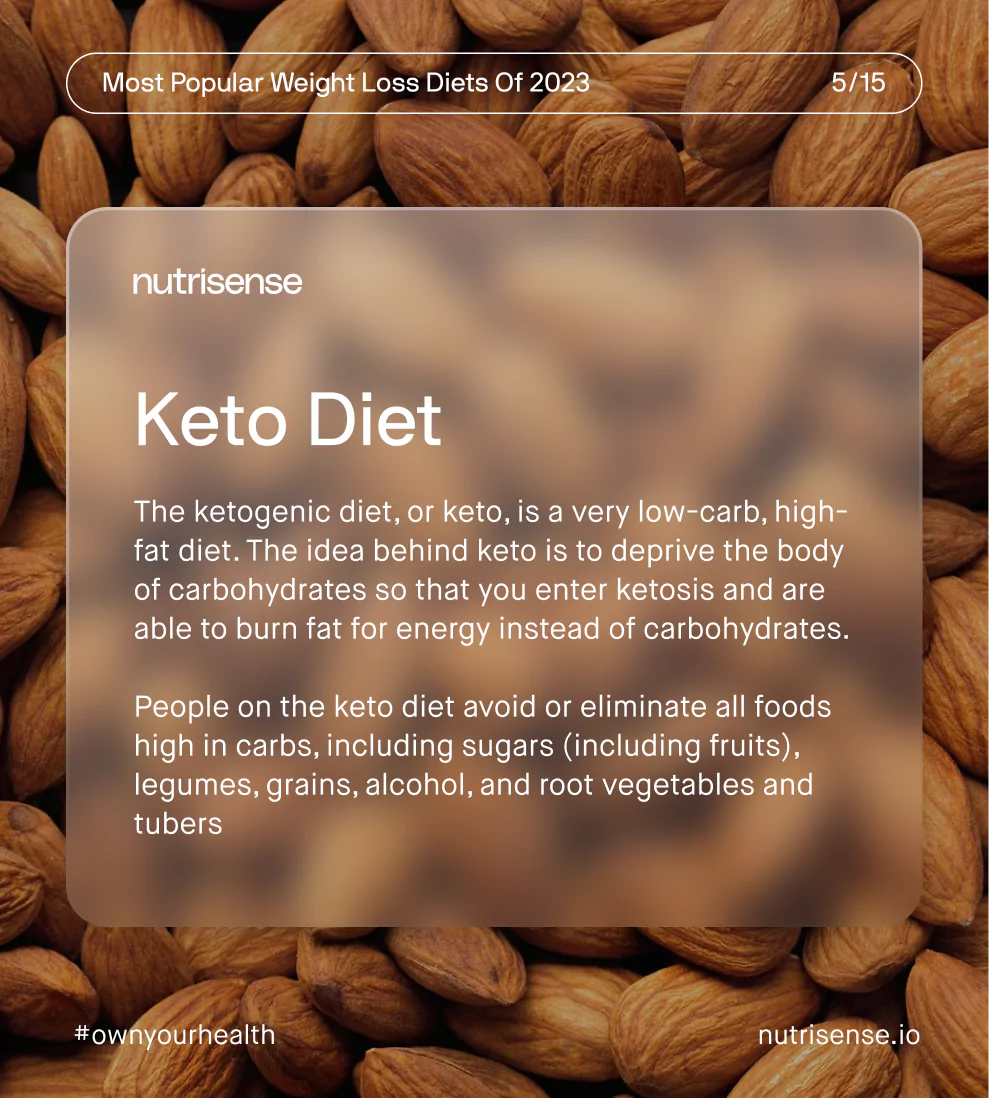
The ketogenic diet, or keto, is a very low-carb, high-fat diet. The idea behind keto is to deprive the body of carbohydrates so that you enter ketosis and are able to burn fat for energy instead of carbohydrates.
People on the keto diet avoid or eliminate all foods high in carbs, including sugars (including fruits), legumes, grains, alcohol, and root vegetables and tubers. They eat things like:
- Meat
- Fatty fish
- Eggs
- Butter and cream
- Cheese
- Nuts and seeds
- Oils
- Low-carb vegetables
What Heather Thinks:
Some researchers believe that restriction of carbohydrates causes hormonal changes that promote body fat loss more so than dietary fat restriction. However, research is conflicted when it comes to these diets and weight loss.
If someone has diabetes or insulin resistance, there is some evidence that a lower carb approach may be more beneficial for multiple metabolic markers, including blood glucose, than simply reducing calories alone.
While the short-term effects of keto are well-researched, any potential longer-term risks are still fairly unknown.
6) Atkins Diet
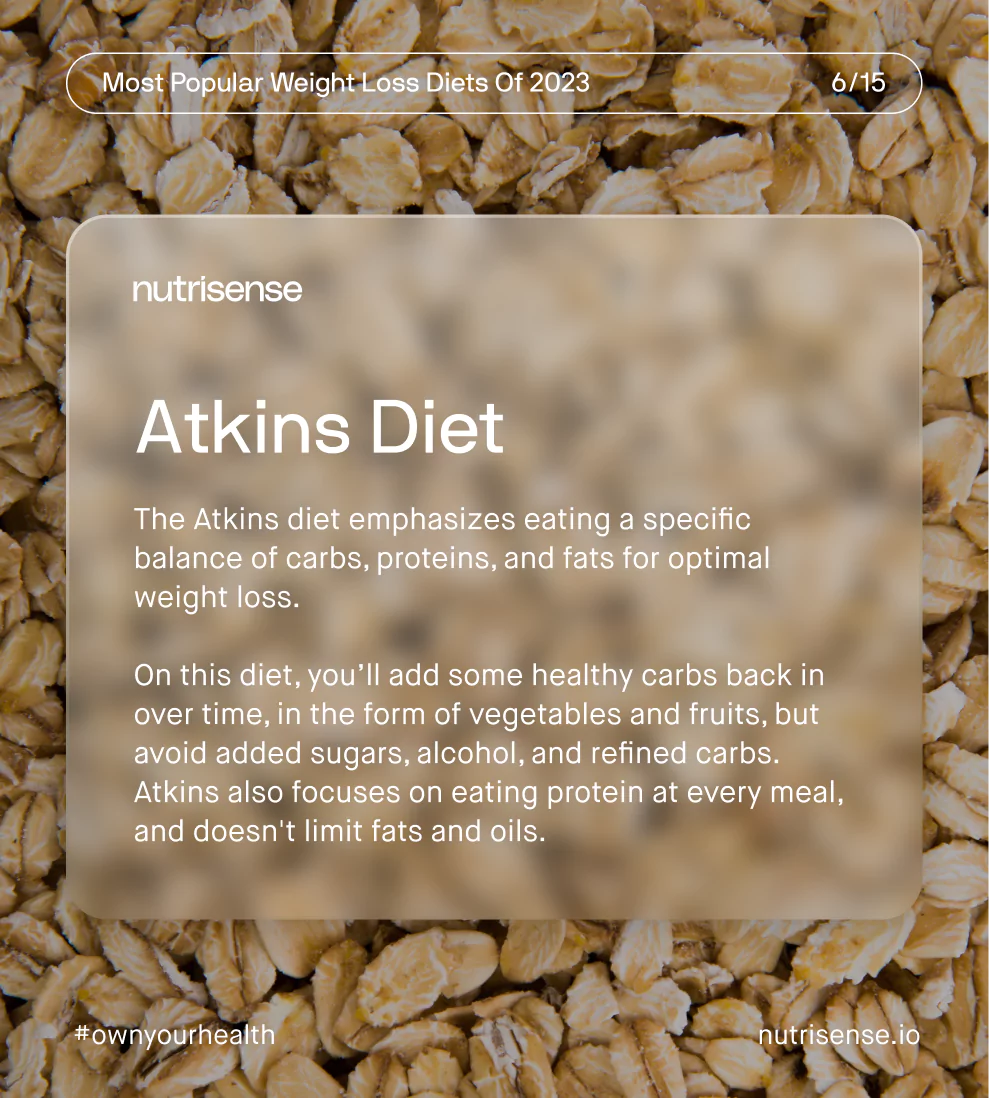
The Atkins diet is a low-carb eating plan named after heart specialist Robert Atkins. The diet emphasizes eating a specific balance of carbs, proteins, and fats for optimal weight loss.
On this diet, you’ll add some healthy carbs back in over time, in the form of vegetables and fruits, but avoid added sugars, alcohol, and refined carbs. Atkins also focuses on eating protein at every meal, and doesn't limit fats and oils.
What Heather Thinks:
The Atkins diet and the keto diet are very similar, in principle. Therefore, all of my above thoughts about the keto diet may be applied here as well.
Research has shown that the Atkins diet may be effective at both long-term and short-term weight loss. Though, again, it does not appear to be superior in its weight loss effects compared to regular calorie restriction.
Some research shows that the Atkins diet can lead to an increase in LDL cholesterol, which might raise your risk of heart attack and stroke. However, these connections are debated.
7) Mayo Clinic Diet

The Mayo Clinic diet is a weight-loss program designed to help people lose six to 10 pounds in the first two weeks, and an additional one to two pounds per week until goal weight is reached. It emphasizes increasing physical activity and eating healthy foods, like whole grains, healthy fats, and unlimited amounts of vegetables and fruits.
What Heather Thinks:
The Mayo Clinic diet might be considered a more holistic weight-loss diet than some other diets on this list, focusing on lifestyle habits beyond diet, like physical activity and exercise. That being said, I think it may leave a lot to be desired in terms of specific dietary guidance.
There is no comprehensive research to support the efficacy of this specific diet for weight loss. However, studies do show that high-fiber diets such as this one can lead to weight loss.
I would personally recommend a far more customized approach to building a diet for weight loss and metabolic health that offers more detailed guidance on particular nutrients and meal composition.
8) Intermittent Fasting

Intermittent fasting is a diet involving alternating periods of fasting and eating. There are different approaches to intermittent fasting. Some practice alternate-day fasting, or eating a normal diet one day and fasting for most or all of the next day.
Others practice daily time-restricted fasting, which involves eating normally within a certain window each day and fasting the rest of the day.
What Heather Thinks:
Some believe that by fasting for longer periods of time, you can encourage your body to shift into a fat-burning state. But while studies have suggested that certain types of intermittent fasting may result in weight loss, current research does not consistently show that intermittent fasting is superior to continuous low calorie diets for weight loss success.
For a far more in-depth discussion of intermittent fasting and weight loss, see our related article.
9) Volumetrics Diet

The Volumetrics diet is focused on eating nutrient-dense, low-calorie foods like fruits, vegetables, whole grains, and low-fat dairy and avoiding added sugars, fatty meats and processed foods.It also encourages 30-60 minutes of physical activity per day.
It’s based on research done by Barbara Rolls, a nutrition and obesity researcher, published in her book called The Ultimate Volumetrics Diet. The idea of the diet is that foods with low calorie density are more filling, and the more you eat of these, the less you will eat in general.
What Heather Thinks:
The Volumetrics diet categorizes food into four groups based on its caloric density. While we do see research showing that reducing dietary energy density is effective for weight loss, calories are far from the full story of what impacts weight.
Scientists have come to believe that many of the energy balance equation applications are over-simplified and inadequate to understand weight loss. This diet may not only fail in over-emphasizing the role of calorie-counting, but because it involves calculating the calorie-density for every meal you eat, it can be time-intensive and not feasible for some people.
10) MIND Diet

The MIND diet stands for Mediterranean-DASH Diet Intervention for Neurodegenerative delay. It is a combination of aspects of the Mediterranean and DASH diets, and is based on research that adherence to these diets may slow cognitive decline with age.
The diet focuses on eating lots of vegetables (particularly green, leafy vegetables), fruits (particularly berries), nuts, olive oil, whole grains, legumes, and fish. It also focuses on reducing high-fat dairy, cheese, red meat, fried foods, processed foods and added sugars.
What Heather Thinks:
As you might notice, many of the beneficial components of different diets focus on high nutrient density from whole food sources. Additionally, they commonly recommend lower intake of added sugar and processed foods. Indeed, for these features, this diet does likely confer some benefit.
The MIND diet is associated with a slower rate of cognitive decline after stroke, may reduce the risk of Alzheimer’s disease, and may be associated with better cognitive functioning in general.
11) The Low-Fat Diet
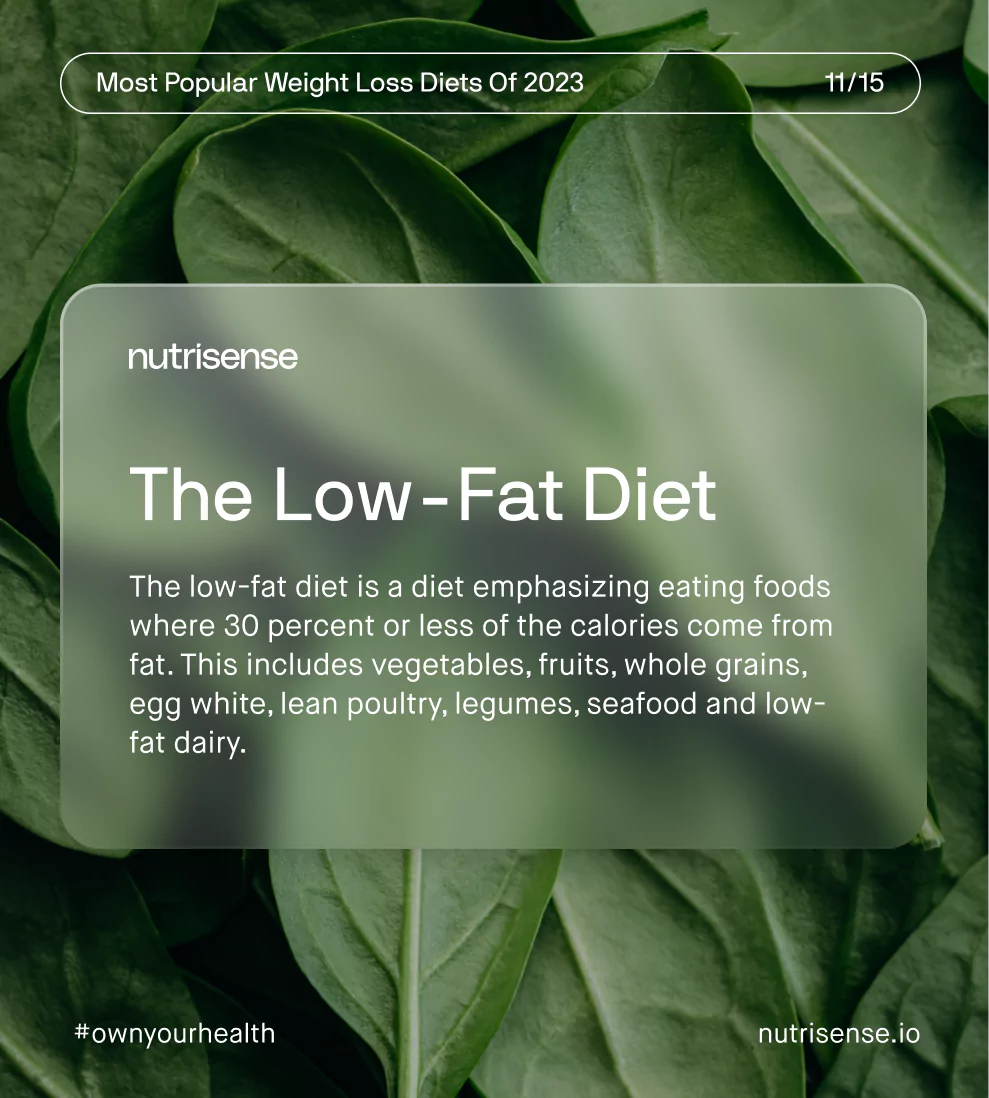
The low-fat diet is a diet emphasizing eating foods where 30 percent or less of the calories come from fat. This includes:
- Vegetables
- Fruits
- Whole grains
- Egg whites
- Lean poultry
- Legumes
- Seafood
- Low-fat dairy
What Heather Thinks:
Food being low in fat does not inherently mean it is healthy or beneficial for weight loss. For example, some processed foods can be marketed as low-fat, but be full of refined carbs, which have been shown to negatively affect health.
Though the research is somewhat conflicted, some of it shows that low-fat diets may not be as effective as high-fat, low-carb diets for weight loss. One of the biggest concerns we see with low-fat diets is the way they may decrease intake of healthy essential fatty acids and even lead to reduced ability to absorb fat-soluble vitamins like A, D, E, and K.
12) Weight Watchers (WW) Diet

WW is a popular weight loss program that uses a personalized points system in which foods are assigned a certain number of points based on their calorie content and nutritional value.
Some foods, like non-starchy veggies, fruits, fat-free yogurt, eggs, seafood, poultry, and legumes, are considered zero-point foods that can be eaten without tracking.
What Heather Thinks:
Research shows that a Weight Watchers diet can be effective for weight loss. However, it does not necessarily guarantee a balanced diet because members can theoretically eat whatever they want.
This may include high-sugar and processed foods, as long as it stays within their allotted points. As a result, this diet may fail to address many important nutrition elements that influence weight and health outcomes.
13) The Flexitarian Diet / Vegetarian Diet

A vegetarian diet is characterized by eliminating meat from your diet, while a flexitarian diet is a mostly plant-based diet that allows for some animal products, like fish and occasional meat.
A mostly-plant based diet rich in fruits, vegetables, legumes, whole grains, nuts, other plant-based protein sources, and healthy oils with a low intake of refined sugars and processed foods is recommended for these diets.
What Heather Thinks:
In many ways, a well-balanced Flexitarian approach may be similar to the Mediterranean Diet and may offer some of the same benefits. However, it’s important to also consider each person’s unique nutrient needs and health history.
Though flexitarian diets may show benefits for weight loss, improved metabolic health, and reduces risk of type 2 diabetes, it’s important to make sure nutrient needs are still being met.
Cutting animal products from your diet may result in loss of some important nutrients, so it may take some extra planning to incorporate these nutrients into your diet.
14) The High-Protein Diet
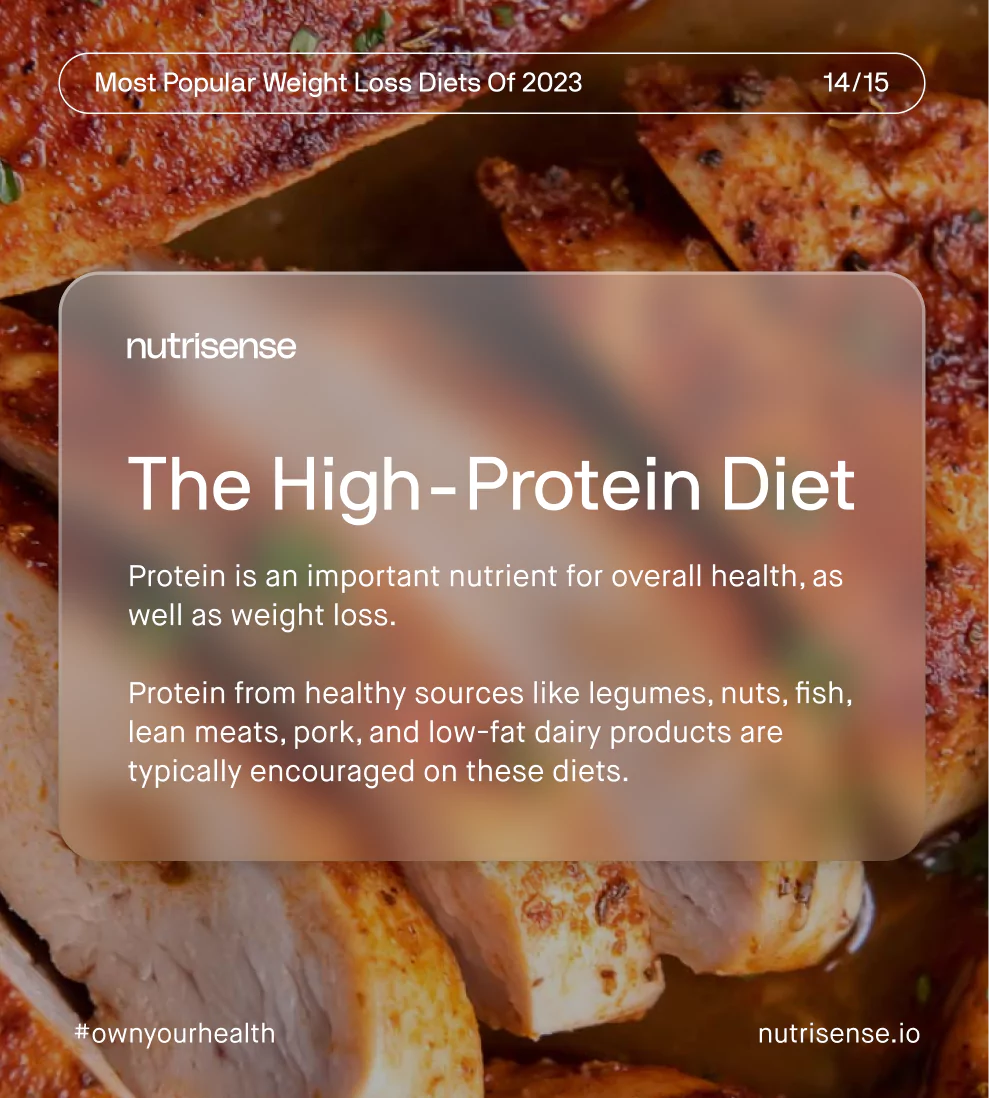
Protein is an important nutrient for overall health, as well as weight loss. Some high-protein diets may encourage a high-consumption of protein alongside a low consumption of carbs.
Protein from healthy sources like legumes, nuts, fish, lean meats, pork, and low-fat dairy products are typically encouraged on these diets.
What Heather Thinks:
First, it’s important to define what “high protein” means. Studies may be somewhat inconsistent when deciding what range of protein qualifies as “high” and this can be a potential methodological flaw.
Adequate protein intake for active adults typically falls between 1.2-2.0 grams per kilogram of bodyweight per day according to most research, though there can be reasons why needs might rise higher.
Research shows that high-protein diets providing adequate amounts of protein to meet individual needs can be beneficial for weight loss because they help:
- Support lean muscle mass
- Increase feelings of fullness
- Boost the amount of calories you burn
15) The Anti-Inflammatory Diet
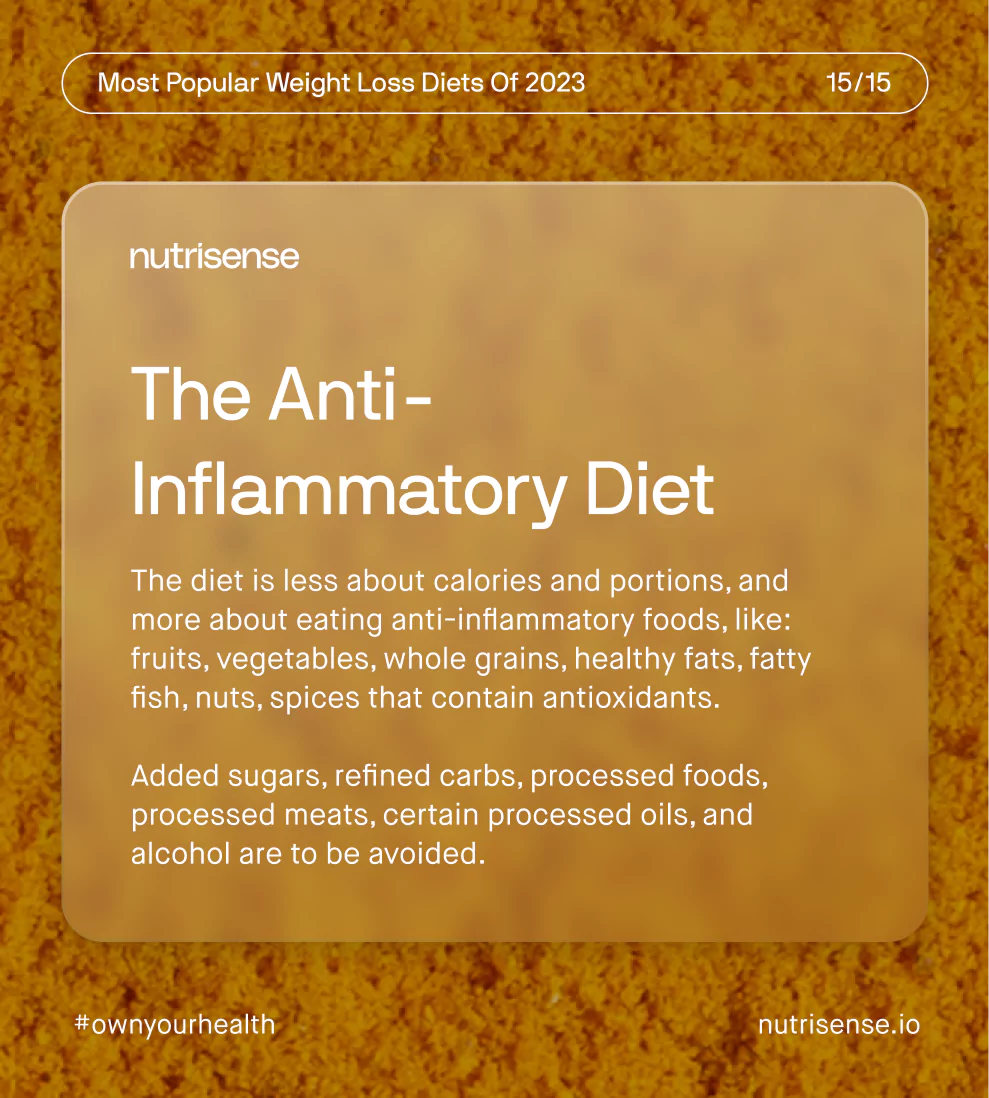
Proponents of the anti-inflammatory diet believe that the typical American diet can cause or worsen chronic inflammation in the body, and that eating fewer of certain foods can reduce the risk of inflammation.
The diet is less about calories and portions, and more about eating anti-inflammatory foods, like:
- Fruits
- Vegetables
- Whole grains
- Healthy fats
- Fatty fish
- Nuts
- Spices that contain antioxidants
Added sugars, refined carbs, processed foods, processed meats, certain processed oils, and alcohol are to be avoided.
What Heather Thinks:
I like to think of this approach as more of a principle-based approach rather than a diet with specific macronutrient or calorie goals. However, this is also why a diet such as this may need further customization to find the right nutrient balance and meal-time structuring to support weight and health goals.
While the anti-inflammatory diet is not exclusively a weight loss diet, research shows that it can be effective for weight management. An increase in anti-inflammatory foods may also reduce the risk of heart disease, depression, and type 2 diabetes.
Find the right Nutrisense programto turn insight into progress.
Go Beyond Glucose Data with Nutrisense
Your glucose can significantly impact how your body feels and functions. That’s why stable levels are an important factor in supporting overall wellbeing. But viewing glucose isn't enough. Nutrisense, you’ll be able to learn how to use your body's data to make informed lifestyle choices that support healthy living.
One-to-one coaching
Sign up to access insurance-covered video calls to work with a glucose expert: a personal registered dietitian or certified nutritionist who will help tailor your lifestyle and diet to your goals.
Monitor and measure what matters
With the Nutrisense CGM Program, you can monitor your glucose with health tech like glucose biosensors and continuous glucose monitor (CGM)s, and analyze the trends over time with the Nutrisense App. This will help you make the most informed choices about the foods you consume and their impact on your health.
Find your best fit
Ready to take the first step? Start with our quiz to find the right Nutrisense program to help you take control.

Heather is a Registered and Licensed Dietitian Nutritionist (RDN, LDN), subject matter expert, and technical writer, with a master's degree in nutrition science from Bastyr University. She has a specialty in neuroendocrinology and has been working in the field of nutrition—including nutrition research, education, medical writing, and clinical integrative and functional nutrition—for over 15 years.




